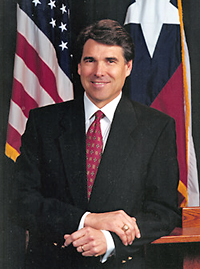| Texas Governor Rick Perry Says No to Obama Education Department’s “Race to the Top” Initiative |
 |
|
By Ashton Ellis
Wednesday, January 27 2010 |
When it comes to the creeping socialism stretching from President Barack Obama’s Washington, D.C., Texas Governor Rick Perry has a three word response, “No, thank you.” On January 13, Perry announced that Texas would not participate in the U.S. Department of Education’s “Race to the Top” competition. The program invites all states to submit proposals for receiving a portion of a set-aside fund. It is a “race” because there is a limited pile of money that only a handful of states can claim. The “top” refers to the Department’s goal of choosing proposals that will improve student learning. To cash-strapped education budget directors or school administrators, the specter of federal dollars to fill in funding gaps is quite attractive. To a states’ rights advocate like Perry, it’s an opportunity to remind people about the importance of just saying no to more federal influence. This is how state sovereignty gets lost. The federal government dreams up an intriguing program that promises an infusion of money. Bureaucrats and their friends in the political establishment push the program into the public consciousness with grand promises and feel-good projections about bright futures for all participants. Take the money, it’s argued; why pass up a freebie when the feds are picking up the tab? Such programs are never “free;” there are always strings attached. In this instance, “winning” the race to the top means ending up in a nationally prescribed program. At the press conference announcing his decision, Perry said the main reason to keep Texas out of the competition would be the resulting loss of local control over curriculum standards. The State Board of Education just finished its own version of solicitation, review and adoption of core classroom content after receiving significant input from education and business leaders. If Texas wins a grant, it would have to jettison its new college prep program for whatever the Department of Education deems necessary to meet its own criteria of achievement. And since the focus under No Child Left Behind is every student meeting a threshold of competence, Texas’ goal to do more could be replaced with an agenda emphasizing adequacy over excellence. A review of Race to the Top guidelines reveals trading years of mandatory federal regulations for a one-time award. Once the money is spent, Texas would be required by law to take orders from Washington bureaucrats. Politically, it would have been easy for Perry to allow the Texas Education Agency to submit a proposal. After all, he is in a tight primary battle with moderate challenger Kay Bailey Hutchison. Since education is an evergreen issue seemingly always in need of more money, promising to turn on the federal spigot might have scored some points for Perry with Hutchison supporters. That he didn’t and took hardly any heat in the polls says a lot about the current mood of the country. It also provides an object lesson for Tea Party advocates seeking to breathe life back into the Tenth Amendment. To many conservatives, the text of the Tenth Amendment outlines a concrete, if largely ignored, allocation of powers: “The powers not delegated to the United States by the Constitution, nor prohibited by it to the States, are reserved to the States respectively, or to the people.” With this in mind, there are groups organizing to elect candidates who will oppose increases in federal spending. But that strategy only addresses part of the problem. America won’t get its fiscal house in order until state and local governments refuse to take federal money. That may sound unlikely, but it’s critical to remember that many of the federal mandates that hamstring state governments are self-imposed. A recent Heritage Foundation paper suggests that state leaders upset with the current shape of health care “reform” should simply refuse to take the Medicaid money that triggers Congress’ power to regulate through spending. True, the loss of federal Medicaid dollars would be a big blow to state budgets, but like a business bereft of stimulus money, states would have an opportunity to reevaluate the level of services they can actually afford to provide, and some argue they could better structure health care services to meet specific state needs. The 2010 calendar year is already shaping up to see nationwide public employee layoffs due to low tax receipts and the inability of the federal government to bail out everyone. So, why not enlist all the state-level free market think tanks churning out proposals to limit government while increasing choice and prosperity? If you haven’t visited the website of the nearest State Policy Network member, you owe it to yourself to take a look at what freedom-first public policies would look like. The Texas precedent of refusing federal money should open the door for reform-minded Tenth Amendment adherents to present compelling alternatives to big government liberals and conservatives. The principal strength of the Tea Party movement is its spot-on critique of the political status quo. Its weakness is that it is perceived (often unfairly, to be sure) to have no alternative to the Democrats’ spending plans other than voting no. To win and steadily advance the practical application of conservative principles, those who are correctly thinking locally as well as nationally would do well to take a cue from Rick Perry – when faced with an offer that will decrease your policy choices, just say no. And then, tell everybody why nobody messes with a state’s right to be better than the national average. |
Related Articles : |
























